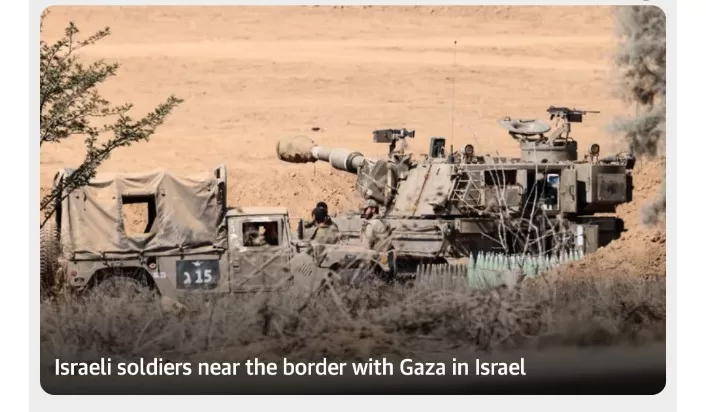In a strategic move, Israeli forces have initiated a significant but circumspect incursion into the Gaza Strip, marking a new chapter in their ongoing conflict with Hamas. This night-time operation, led by infantry units supported by tanks and armored bulldozers, penetrated deep into the northern region of the coastal enclave. The mission’s objective was to assess the Hamas threat and search for tunnel networks, serving as a prelude to a more sustained ground offensive.
The incursion, extending approximately one kilometer from the border fence, coincided with European Union (EU) leaders drafting a resolution calling for “humanitarian corridors and pauses” in the hostilities to facilitate the urgently needed delivery of aid to Gaza. As the situation escalates, the death toll in Gaza, according to the Hamas-administered health ministry, has surpassed 7,000, with concerns that the number could rise further if Israel proceeds with a ground invasion. The United Nations has grimly asserted that “nowhere is safe” in Gaza.
In response to the Israeli operation, Hamas’s military branch announced that nearly 50 Israeli hostages, held since the commencement of hostilities on October 7th, had been killed in Israeli airstrikes on Palestinian territory. The Israeli military, on the other hand, clarified that this operation aimed to assess Hamas’s capabilities, particularly those involving Kornet anti-tank guided missiles, which pose a significant concern to Israeli defense.
Despite an anti-tank fire incident targeting an Israeli tank during the operation, Israeli forces successfully withdrew without incurring casualties. While Israeli troops have conducted previous forays into Gaza during this conflict, this latest incursion stands out due to its expanded scale, geared toward shaping the conditions for further engagements along the immediate border.
Israel has been relentlessly bombarding Gaza since Hamas initiated the conflict, prompting Israeli Prime Minister Benjamin Netanyahu to declare preparations for a substantive ground offensive, warning that “hellfire” would rain down upon the enemy. With tens of thousands of troops massed at the Gaza border, the specifics of this ground offensive remain undisclosed to the public.
Against the backdrop of a deteriorating humanitarian situation in Gaza, the EU has expressed its gravest concern and joined the call for a pause in hostilities to allow humanitarian access to 1.4 million displaced Palestinians. The draft EU declaration underscores the urgent need for “humanitarian corridors and pauses” to ensure the safe and rapid delivery of essential aid.
Concurrently, Israeli forces continued their airstrikes, targeting approximately 250 locations, including the Israeli navy’s operation against ground-to-air missile launchers near Khan Younis in southern Gaza. Amid these ongoing hostilities, there have been reports of negotiations to secure the release of a substantial number of hostages in the coming days.
In the midst of this tumultuous situation, the World Health Organization (WHO) has called upon Hamas to provide evidence of life regarding the hostages it is holding and to release them on humanitarian grounds. The plight of the abducted, including children, women, and the elderly, is exacerbated by their pre-existing health conditions and the acute psychological trauma they endure.
The international community remains deeply alarmed at the civilian suffering within Gaza. Both Israeli and Hamas officials have hinted at the possibility of an escalation in the conflict. Saleh al-Arouri, the Lebanon-based deputy head of Hamas’s political bureau, stated that the “real battles” had not yet begun, while Benny Gantz, a member of Israel’s war cabinet, anticipated a more intense phase in the war.
As the situation unfolds, international leaders are closely monitoring developments, and U.S. President Joe Biden has called on Israeli Prime Minister Netanyahu to prioritize the safe release of hostages in any forthcoming actions. Despite these pleas for restraint, the conflict’s future remains uncertain. This incursion comes at a time when the UN has warned of a fuel shortage in Gaza, compelling a significant reduction in relief efforts in a region that has been under siege since the initiation of the conflict by Hamas.




